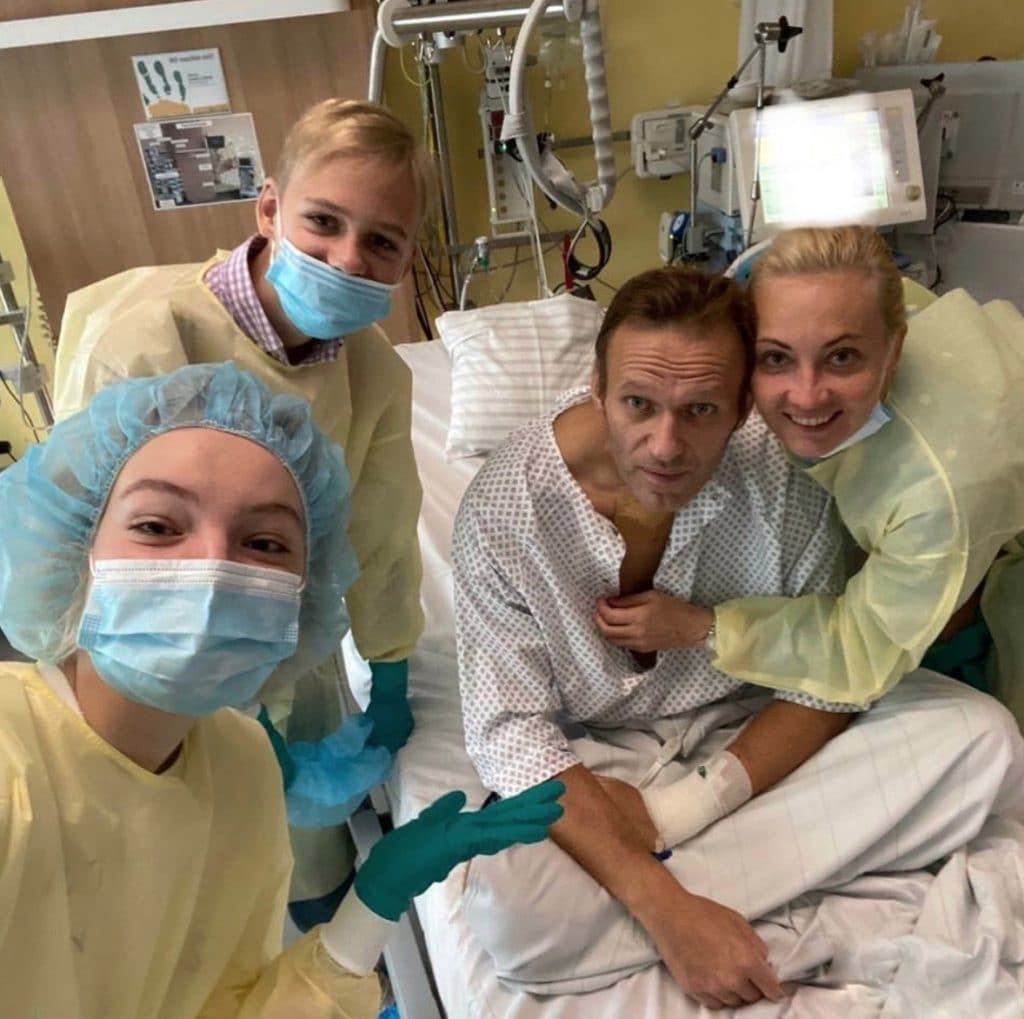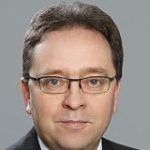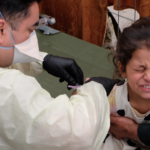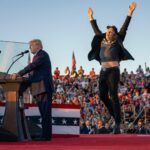The Navalny poisoning: Moscow evades accountability and mocks the Chemical Weapons Convention
By Oliver Meier, Alexander Kelle | October 19, 2021
 A photo shared on Russian opposition leader Alexey Navalny's instagram account shows Alexey Navalny on a hospital bed surrounded by his wife and two children as his treatment continues at Charite Hospital in Berlin, Germany on September 15, 2020. Navalny was poisoned, German doctors from a clinic where he is being treated announced. (Photo by Alexey Navalny Instagram Account /Handout/Anadolu Agency via Getty Images)
A photo shared on Russian opposition leader Alexey Navalny's instagram account shows Alexey Navalny on a hospital bed surrounded by his wife and two children as his treatment continues at Charite Hospital in Berlin, Germany on September 15, 2020. Navalny was poisoned, German doctors from a clinic where he is being treated announced. (Photo by Alexey Navalny Instagram Account /Handout/Anadolu Agency via Getty Images)
Russia recently rejected a Western proposal to use the Chemical Weapons Convention’s (CWC) consultation and clarification procedures to resolve allegations that it is responsible for the poisoning of Alexei Navalny. In doing so, Moscow has slammed shut the door to the least confrontational solution to the dispute. The international community will now have to weigh next steps carefully, balancing the need to clarify the nerve agent attack on the Russian opposition leader with the risk of further alienating Moscow and its allies from the chemical weapons prohibition regime.
The request. During an early October session of the Executive Council, the policy-making body of the Organization for the Prohibition of Chemical Weapons (OPCW), the United Kingdom triggered a CWC treaty mechanism to ask for Russian assistance in seeking clarity on the circumstances under which Navalny, a leading figure in political opposition to Russian President Vladimir Putin, was poisoned on August 20, 2020. With the support of 44 mostly Western countries, the UK activated the CWC’s Article IX (2) process. Under this mechanism, every state party to the convention has the right to seek clarification, through consultations, on any doubts about compliance with the treaty or “a related matter which may be considered ambiguous.”
The request came against the background of deepening crisis between Russia and the OPCW. Russia has repeatedly accused the West of politicizing the organization, which monitors how member states implement the Chemical Weapons Convention. Moscow specifically alleges that Western countries instigate investigations on chemical weapons use to undermine “OPCW foundations for the sake of geopolitical interests of the Euro-Atlantic ‘community’.” Moscow has rejected OPCW findings that the Syrian armed forces are responsible for chemical weapons attacks and has discarded allegations that it was behind the March 2018 chemical weapons attack on former Russian agent Sergei Skripal in Salisbury, UK.
Bulgaria, speaking for the co-sponsors of the October clarification request, however, stated that “Russia has not yet provided a credible explanation of the incident that took place on its soil.” The Bulgarian representative complained that “we have no knowledge of any internal investigations taking place in the Russian Federation. Nor do we know what, if anything, the Russian Federation will do to prevent future uses of chemical weapons on its territory.” The supporters of the clarification request asked Russia four specific questions, including on actions Russia has taken “to address [the Navalny] incidence in light of its obligations under the CWC”; on the “results and conclusions” of such investigations; on further steps Moscow intends to take to clarify the incident; and on “the state of play of the envisaged cooperation with the OPCW.”
The US government supported the request by arguing that Russian agents have “poisoned Mr. Navalny in Russia using an unscheduled nerve agent from a Novichok group of agents, and only Russia has researched, developed, and used such chemical weapons.”
Fist closed. Russia could have used the procedure as an off-ramp from the political and diplomatic escalation between it and the OPCW. Consultation and clarification requests are the softest instrument in the convention’s compliance toolbox.
Interestingly, the co-sponsors were careful not to describe Russia’s lack of cooperation as violation of a CWC core prohibition. Rather, they framed Russia’s behavior as a possible failure to implement Article VII, under which CWC members must translate the comprehensive prohibition of chemical weapons into national laws and are obligated to enforce such regulations.
Russia itself had proposed in 2018 to use the CWC’s consultation provisions under Article IX (2) to clarify allegations that it was behind the Skripal assassination. Also, the recent UK request mentions that Moscow had asked the OPCW in October 2020 to send a so-called Technical Assistance Visit to help clarify the circumstances of Navalny assassination. (London, however, laments that Russia had failed to follow up that request.)
The states requesting clarification chose the least confrontational approach possible under the circumstances. By describing the Navalny attack as a possible failure of proper domestic law enforcement, rather than as part of state-run program to develop and use modern nerve agents against political opponents, they appear to have offered a face-saving avenue for Russia out of the confrontation.
Under the clarification procedure, Russia would have had 10 days to respond. Yet, Moscow showed no willingness to use this space to explore opportunities of engagement with the OPCW.
Only two days after Western states had tabled the request, Russia retorted by turning it on its head. On October 7, Moscow tabled a 235-page document on the Navalny investigation that collates OPCW communication with Russia, some (previously confidential) exchanges between German, French, and Swedish authorities with their Russian counterparts, news articles, and Parliamentary inquiries from Germany’s neo-fascist party Alternative für Deutschland, which spin around conspiracy theories related to the poison attack. Russia asked a range of questions to Germany, France, and Sweden. Laboratories in these countries had confirmed, on behalf of the OPCW, that Alexei Navalny had indeed been poisoned with the nerve agent Novichok.
The tone and substance of the tit-for-tat response was obviously not intended to pave a way for cooperative solution of the dispute. Russia made this clear by issuing an October 16 deadline for response. In short: If the UK request was intended as an open hand, it was met with a Russian closed fist.
What now? Given Russia’s wrong-headedness, there appear to be only bad options, going forward. The current situation creates a dilemma for the West, which has an interest in having a well-functioning Chemical Weapons Convention. With 193 state parties, the treaty is approaching universal membership. More than 98 percent of declared chemicals weapons world-wide have already been destroyed under OPCW verification. Russia itself has eliminated about 40,000 tons of chemical warfare agents under international monitoring after it acceded to the convention in 1997.
Russia’s compliance with and support of the convention remains crucial for its effective implementation, not least because Russia is a permanent member of the UN Security Council, which OPCW member states can call on to be the final arbiter on non-compliance with the comprehensive prohibition of chemical weapons.
At the same time, several states made clear during the Executive Council meeting that they are not willing to let their demands for accountability for Novichok use go unanswered. Nor should they: The international community must be assured that the Russian Novichok program has been completely dismantled. Lingering doubts about Russian compliance with the prohibition of chemical weapons would undermine the trust in the effectiveness of the Chemical Weapons Convention. From a disarmament perspective, this is a key reason why accountability matters.
If Russia continues to stall, any CWC state party could ignite the next stage of the treaty’s compliance mechanism and trigger the Article IX (3) – (7) procedure. A multistage process would follow in which Moscow would be required to provide further clarification. The OPCW director-general could establish a group of experts to “examine all available information and data relevant to the situation causing the concern.” A special session of the Executive Council could “recommend any measure it deems appropriate to resolve the situation.” At the end of the process, after 60 days, a special meeting of the conference of the states parties can be requested to discuss the findings and refer the case to the UN Security Council, which has the power to impose sanctions.
States parties could also initiate a challenge inspection to clarify the allegations. Yet, even though much is known about the program and those who run it, there are doubts that such a focused and intrusive inspection could expose illicit activities. What is more, Russia could respond in a tit-for-tat manner, further politicizing the situation. In the debate about the decision by member states to suspend Syria’s voting rights because of its failure to comply with OPCW clarification requests, Russia’s deputy UN ambassador, Dmitry Polyansky, pointedly asked: “If you deprive Syria of its right to participate in decisions made within the organization, what is the point of Damascus to continue working with them at all?” Applied to the current situation, the rift with the OPCW may become so big that Russia threatens to leave the treaty regime.
The deadlock just described demonstrates the limitations of multilateral instruments to deal with great power intransigence. Donald Trump exploited this Achilles’ heel when he decided in May 2018 that the United States would no longer comply with the Iran nuclear deal and then attempted to misuse the so-called snap back mechanism under the Joint Comprehensive Plan of Action to force others to play along. Now, Russia is shielding itself with treaty-based clarification procedures rather than using them to resolve the issues at hand.
At a time when Russia and the United States are again seriously engaging in a dialogue on strategic stability, the escalation over the use of chemical weapons seems like an anachronism. To be sure, all sides should use all available diplomatic avenues to resolve the dispute over the chemical weapons attack. But continued Russian mocking of the CWC’s multilateral mechanisms will lead to a further escalation of the situation. The responsibility for holding those behind the Navalny assassination accountable and reducing the polarization among Chemical Weapon Convention members that has developed over this issue continues to lie with Moscow.
Editor’s note: This article was published as part of the IFSH project on “Investigating and penalizing chemical weapons use”, funded by the German Foundation for Peace Research.
Together, we make the world safer.
The Bulletin elevates expert voices above the noise. But as an independent nonprofit organization, our operations depend on the support of readers like you. Help us continue to deliver quality journalism that holds leaders accountable. Your support of our work at any level is important. In return, we promise our coverage will be understandable, influential, vigilant, solution-oriented, and fair-minded. Together we can make a difference.
Keywords: Alexei Navalny, Chemical Weapons Convention, OPCW, Putin, Skripal, Syria, nerve agent, novichok
Topics: Analysis, Biosecurity

















(changed)The OPCW is deeply corrupt and instrumentalised by NATO. An OPCW inspector who was at the site of the gas attack in Douma blew the whistle because the OPCW report differed decisively from what the inspectors found at the spot and had placed on record. The inspector came to the conclusion that the Syrian government was not responsible while the final OPCW report claimed the opposite which was what NATO badly needed because it had already “punished” the Syrian government by rocket fire. With high probability, Douma was a false flag operation (s. SCANDAL: The OPCW Syria Cover-up exposed by… Read more »